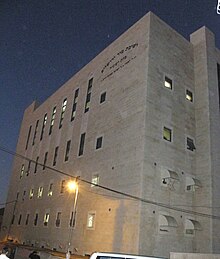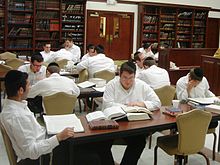| Part of a series on |
| Jews and Judaism |
|---|







A yeshiva (/jəˈʃiːvə/; Hebrew: ישיבה, lit. 'sitting'; pl. ישיבות, yeshivot or yeshivos) is a traditional Jewish educational institution focused on the study of Rabbinic literature, primarily the Talmud and halacha (Jewish law), while Torah and Jewish philosophy are studied in parallel. The studying is usually done through daily shiurim (lectures or classes) as well as in study pairs called chavrusas (Aramaic for 'friendship' or 'companionship').[1] Chavrusa-style learning is one of the unique features of the yeshiva.
In the United States and Israel, different levels of yeshiva education have different names. In the U.S., elementary-school students enroll in a cheder, post-bar mitzvah-age students learn in a mesivta, and undergraduate-level students learn in a beit midrash or yeshiva gedola (Hebrew: ישיבה גדולה, lit. 'large yeshiva' or 'great yeshiva'). In Israel, elementary-school students enroll in a Talmud Torah or cheder, post-bar mitzvah-age students learn in a yeshiva ketana (Hebrew: ישיבה קטנה, lit. 'small yeshiva' or 'minor yeshiva'), and high-school-age students learn in a yeshiva gedola.[2][3] A kollel is a yeshiva for married men, in which it is common to pay a token stipend to its students. Students of Lithuanian and Hasidic yeshivot gedolot (plural of yeshiva gedola) usually learn in yeshiva until they get married.
Historically, yeshivas were for men only. Today, all non-Orthodox yeshivas are open to women. Although there are separate schools for Orthodox women and girls,[4] (midrasha or "seminary") these do not follow the same structure or curriculum as the traditional yeshiva for boys and men.
- ^ Forta, Arye (1989). Judaism. Heinemann Educational. p. 89. ISBN 0-435-30321-X.
- ^ Berezovsky, Rabbi Sholom Noach (2001). נתיבות שלום [Nesivos Sholom]. Feldheim Publishers. p. 211. ISBN 9781583304952.
- ^ Kramer, Doniel Zvi (1984). The Day Schools and Torah Umesorah: The Seeding of Traditional Judaism in America. Yeshiva University Press. p. xiv.
- ^ "Sarah Schenirer a"h, the Mother of the Bais Yaakov Movement, On Her Yahrtzeit, Today, 26 Adar". matzav.com. 2013-03-08. Retrieved 2018-10-06.